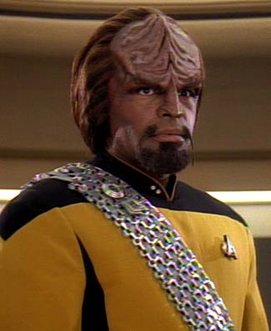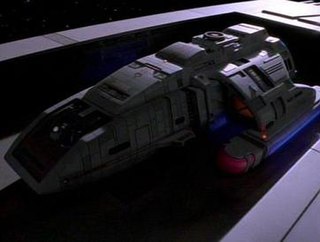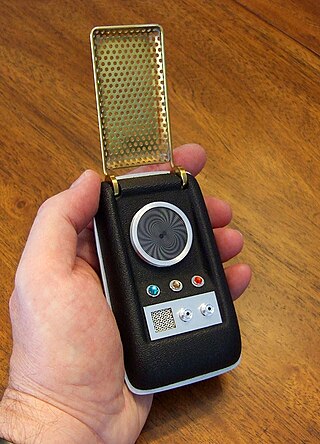Deep Space Nine (DS9)

The Deep Space Nine Role Playing Game was released in 1999. It is based on Star Trek: Deep Space Nine .
| Designers | Christian Moore, Ross Isaacs, Kenneth Hite, Steven S. Long |
|---|---|
| Publishers | Last Unicorn Games |
| Publication | 1998 (Next Generation) 1999 (Deep Space Nine and Original Series) |
| Genres | Science fiction |
| Systems | Icon system |
Star Trek Role-playing Game is a line role-playing games set in the fictional Star Trek universe and published by Last Unicorn Games (LUG). Three games were released: Star Trek: The Next Generation Role-playing Game in 1998, Star Trek: Deep Space Nine Role Playing Game and Star Trek Role Playing Game both in 1999.
Due to licensing issues, LUG did not release the game as a single core rulebook and setting supplements for the various series but instead intended to release a corebook for every series. [1] The Star Trek license was lost to Decipher before a Star Trek: Voyager rulebook could be released.
Steven S. Long and Kenneth Hite joined in the developers working for Last Unicorn Games on the "Icon system" for their line of licensed Star Trek role-playing games; to get The Next Generation Role-playing Game ready for GenCon 31, they were flown out to Los Angeles for two weeks. After the design of Icon was done, Long was made the line developer for the Star Trek: Deep Space 9 role-playing game. [2] : 315
The Next Generation Role-playing Game was released in 1998. It is based on Star Trek: The Next Generation . [3] [4]

The Deep Space Nine Role Playing Game was released in 1999. It is based on Star Trek: Deep Space Nine .

The Star Trek Role Playing Game was released in 1999. It is based on Star Trek: The Original Series .
Last Unicorn Games was one of the first roleplaying companies to use the concept of releasing additional pages for published books via the web. LUG dubbed these "Icon Links," in reference to their overall "Icon System" game mechanics (the term Web Enhancement hadn't been invented yet). Unlike current web enhancements, which are simply additions that can be added to the end of a book, LUG took a unique approach, by planning the enhancements ahead of time, and printing a small Icon symbol at various points in a given book, informing the reader that additional material on the subject-at-hand was available on the company's website to read or download and print. These enhancements are now being stored online, and can be downloaded from Memory Icon, under the Icon Links section.
Many additional books and supplements were planned, and quite a few had various chapters already written in varying degrees of completion when the product line was cancelled. [7] LUG's former pool of writers has been very supportive of the fan movement to expand and continue playing the game. In support of this, much of the unpublished material has been released on the internet.
S. John Ross has posted his unfinished manuscripts on the Untaken Treks pages of his website.
Steve Kenson has posted his unfinished manuscripts on the Star Trek: The Lost Episodes pages of his website.
Steven S. Long has been the most active amongst the fan movement. He took unfinished materials for the game and completed them on his own time. Additionally, he continued this work beyond the original envisioned volumes, completing seven entire new books. These new books were distributed online free of charge.
And the Spacedock Series:
They can be downloaded in PDF form from Memory Icon, under the Spacedock section, and are suitable for printing.
The Next Generation: Narrator's Toolkit was reviewed in the online second version of Pyramid which said "Within this tome are the most useful instructions on how to run a role playing game that I have ever seen set to paper. And it's also useful to anyone running a Star Trek: The Next Generation RPG session." [8]
Star Trek: Deep Space Nine (DS9) is an American science fiction television series created by Rick Berman and Michael Piller. The fourth series in the Star Trek media franchise, it originally aired in syndication from January 3, 1993, to June 2, 1999, spanning 176 episodes over seven seasons. Set in the 24th century, when Earth is part of a United Federation of Planets, its narrative is centered on the eponymous space station Deep Space Nine, located adjacent to a wormhole connecting Federation territory to the Gamma Quadrant on the far side of the Milky Way galaxy.

Worf, son of Mogh is a fictional character in the Star Trek franchise, portrayed by actor Michael Dorn. He appears in the television series Star Trek: The Next Generation (TNG), seasons four through seven of Star Trek: Deep Space Nine (DS9), and the third and final season of Star Trek: Picard, as well as the feature films Star Trek Generations (1994), Star Trek: First Contact (1996), Star Trek: Insurrection (1998), and Star Trek: Nemesis (2002).
In the Star Trek science-fiction franchise, the Maquis are a 24th-century paramilitary organization-terrorist group. The group is introduced in the two-part episode "The Maquis" of the television series Star Trek: Deep Space Nine, building on a plot foundation introduced in the episode "Journey's End" of Star Trek: The Next Generation, and appear in later episodes of those two series as well as Star Trek: Voyager. The Maquis story debuted when three Star Trek television shows running from 1987 to 2001 took place in the same fictional science-fiction universe at the same time in the future. As a result, the Maquis story was told across several episodes in all three shows. The Maquis are especially prominent in Star Trek: Voyager, whose premise is that a Starfleet crew and a Maquis crew are stranded together on the opposite side of the Galaxy.

Julian Subatoi Bashir, MD is a fictional character from the television series Star Trek: Deep Space Nine, portrayed by Alexander Siddig. Bashir is the Chief Medical Officer (CMO) of space station Deep Space Nine and the USS Defiant.

Runabouts are a fictional class of small, multi-purpose starships appearing in the Star Trek science-fiction franchise, primarily the television series Star Trek: Deep Space Nine, which aired on syndicated television between 1993 and 1999. They served as a means of transport for the crew of the fictional space station Deep Space Nine, in the early seasons of the series enabling storylines taking place away from the station.

The communicator is a fictional device used for voice communication in the fictional universe of Star Trek. As seen in at least two instances, the Original Series episodes "Tomorrow Is Yesterday" and "Day of the Dove," it can also serve as an emergency signaling device/beacon, similar to a transponder. The communicator allows direct contact between individuals or via a ship's communication system.
Bill Bridges is an American role-playing game developer and fantasy author. He designed the role-playing games Werewolf: The Apocalypse, Mage: The Ascension, and Promethean: The Created. He additionally worked on a video game based on his Fading Suns role-playing game Emperor of the Fading Suns. He is currently a developer at Holistic Design.
"Q-Less" is the seventh episode of the first season of the American science fiction television series Star Trek: Deep Space Nine (DS9), and aired February 8, 1993.

Star Trek: The Role Playing Game is a role-playing game set in the fictional Star Trek universe published by FASA Corporation from 1982 to 1989.

"Tribunal" is the 25th and penultimate episode of the second season of the syndicated American science fiction television series Star Trek: Deep Space Nine, the 45th episode overall. It was the first episode of the series to air after the conclusion of Star Trek: The Next Generation, the series of which Deep Space Nine was a spinoff.
"Defiant" is the 55th episode of the television series Star Trek: Deep Space Nine, the ninth episode of the third season. This episode guest stars actor Jonathan Frakes, in the role he had originated on Deep Space Nine's predecessor series, Star Trek: The Next Generation. The episode aired in broadcast syndication on November 21, 1994.

Kenneth Hite is a writer and role-playing game designer. Hite is the author of Trail of Cthulhu and Night's Black Agents role-playing games, and lead designer of the 5th edition of Vampire: the Masquerade.

Star Trek: Deep Space Nine – Harbinger is a video game for the MS-DOS and Apple Macintosh operating systems released in March 1996. The game is based upon the television series Star Trek: Deep Space Nine. It was the first Star Trek: Deep Space Nine video game to be released for the PC.
Last Unicorn Games (LUG) was a game publisher owned by Christian Moore that was eventually purchased by Wizards of the Coast.
The Star Trek franchise features many spacecraft. Various space vessels make up the primary settings of the Star Trek television series, films, and expanded universe; others help advance the franchise's stories. Throughout the franchise's production, spacecraft have been depicted by numerous physical and computer-generated models. Producers worked to balance often tight budgets with the need to depict convincing, futuristic vessels.
Several characters within the Star Trek franchise, primary and secondary, often made crossover appearances between one series and another. This included appearances of established characters on premiere episodes of new series, a few long-term transfers from one series to another, and even crossovers between Trek films and television. A few crossover appearances, such as that of Spock on The Next Generation and the time-travel of the crew of Deep Space Nine to the era of The Original Series were especially lauded by both fans and critics.
"The Way of the Warrior" is the first episode from the fourth season of the American syndicated science fiction television series Star Trek: Deep Space Nine, counting as the 73rd and the 74th episodes overall as it is a double-length episode. Michael Dorn joins the cast of Deep Space Nine as Worf, a character originating on the preceding series, Star Trek: The Next Generation.

Star Trek: The Next Generation Role-playing Game is a science fiction role-playing game published by Last Unicorn Games (LUG) in 1998 that is based on the Star Trek: The Next Generation television series. Critical reception was good, and LUG planned to publish other games based on the Star Trek franchise, but lost the Star Trek license in 1999.